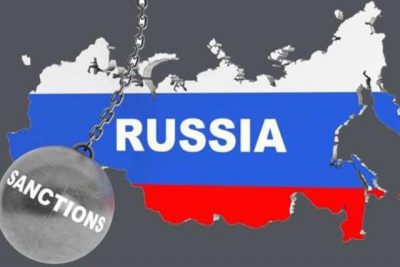Russia Is Still – by Far – the World’s Most-Sanctioned Country

All Global Research articles can be read in 51 languages by activating the Translate Website button below the author’s name (only available in desktop version).
To receive Global Research’s Daily Newsletter (selected articles), click here.
Click the share button above to email/forward this article to your friends and colleagues. Follow us on Instagram and Twitter and subscribe to our Telegram Channel. Feel free to repost and share widely Global Research articles.
New Year Donation Drive: Global Research Is Committed to the “Unspoken Truth”
***
In the wake of its invasion of Ukraine, Russia is now the most-sanctioned country in the world, with 16,077 sanctions on Russian individuals and entities currently in place, nearly six times the amount compared to before it recognized the Luhansk and Donetsk regions as independent states on February 22, 2022.
As Statista’s Florian Zandt shows in the chart below, based on data aggregated by Castellum.AI, Putin’s invasion has pushed Russia past one of the United States’ biggest nemeses in Western Asia.

You will find more infographics at Statista.
Before the invasion of Ukraine, Iran was by far the most-sanctioned state in history, with 3,616 active sanctions by the United States, the United Nations, the EU and countries like Australia, Canada, India and Israel. The relationship between the latter and the Islamic Republic has been especially fraught, with disputes surrounding Iran’s atomic arsenal and its general hostile stance towards Israel threatening to escalate regularly.
The majority of the sanctions imposed on Syria, which ranks third on Castellum.AI’s list, stem from the events surrounding the Syrian civil war starting in 2011. Following civil unrest in connection with the Arab Spring movement, clashes between President Bashar al-Assad’s forces and an unlikely coalition of foreign and domestic actors often opposed on critical issues led to a humanitarian crisis and the internal and foreign displacement of more than half of Syria’s 22 million inhabitants over the years.
Leading the current round of sanctions against Russia are the United States, Canada, Switzerland and the United Kingdom with 3,551, 2,765, 2,225 and 1,749 restrictions, respectively.
The majority of those sanctions target individuals (11,462), while entities have 4,344 sanctions against them, vessels have 169 and aircraft 102. Not included in these figures are sectoral sanctions like general trade embargos on gas or oil.
On top of the sanctions put in place by nation-states and governing bodies, over 1,000 companies have in some capacity withdrawn from the Russian market, according to researchers at the Yale School of Management, among them industry heavyweights like Adidas, Google, Disney, Exxon or Volkswagen.
*
Note to readers: Please click the share button above. Follow us on Instagram and Twitter and subscribe to our Telegram Channel. Feel free to repost and share widely Global Research articles.

